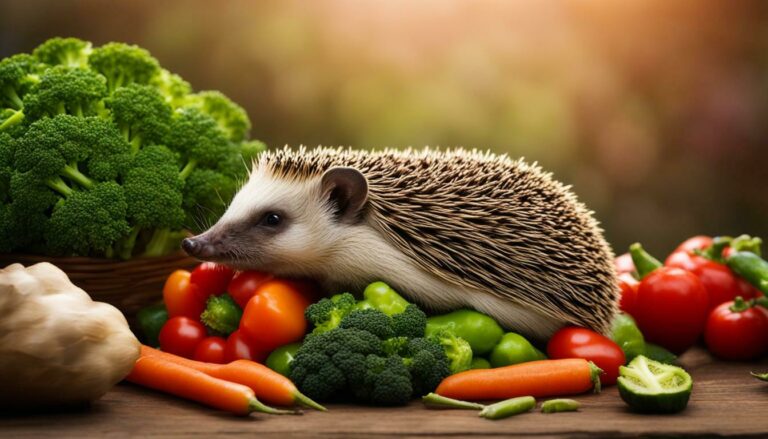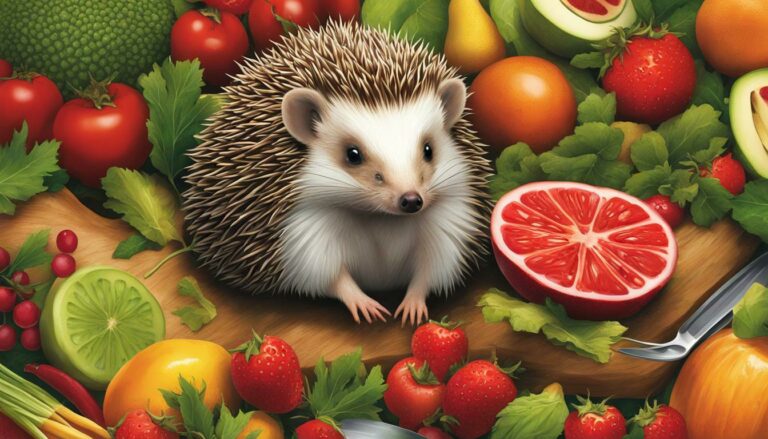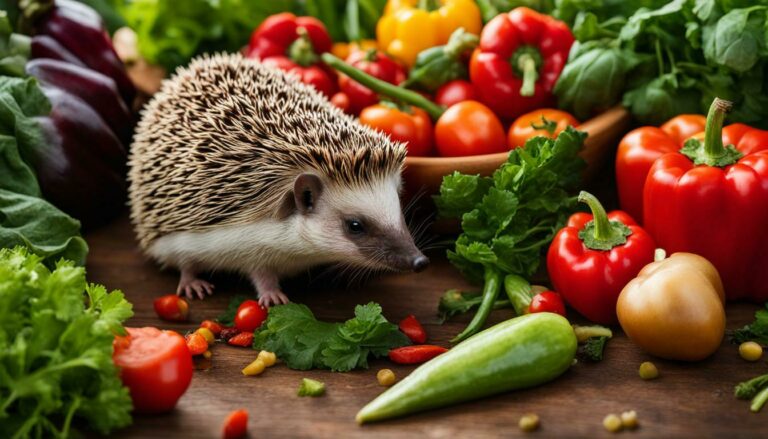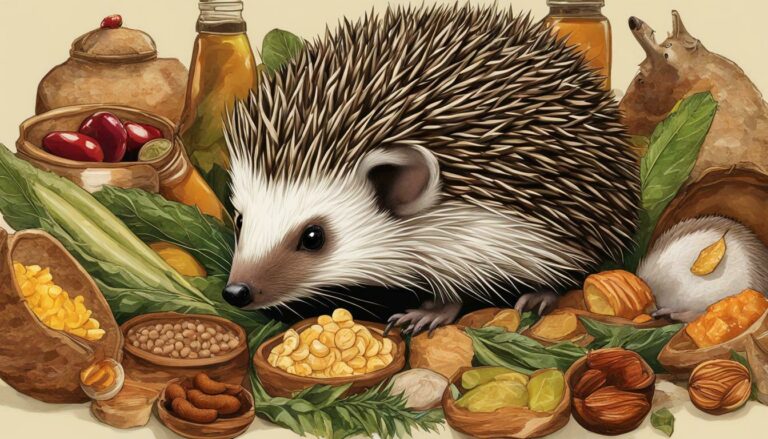Can Hedgehogs Have Raspberries? – Essential Pet Nutrition Guide
Hedgehogs are unique pets that require a specific diet to stay healthy and thrive. In this essential pet nutrition guide, we will explore whether hedgehogs can have raspberries and provide important information on their dietary needs.
Key Takeaways:
- Raspberries can be a tasty treat for hedgehogs, but should only be given in moderation.
- High-quality poultry-based cat food is the staple diet for hedgehogs.
- Insects, such as mealworms and crickets, can be given as occasional treats.
- Fruits and vegetables should only be given in small amounts and chosen carefully.
- Avoid giving hedgehogs foods that are toxic or unhealthy for them, such as avocados, bread, and chocolate.
Understanding Hedgehog’s Natural Diet and Treats
Hedgehogs are classified as insectivores and their diet mainly consists of meat protein, similar to cats and ferrets. However, they can also enjoy fruits and vegetables as occasional treats. In the wild, hedgehogs forage and rummage for insects and small animals to fulfill their nutritional needs. Their natural diet includes worms, caterpillars, slugs, beetles, and other invertebrates. These insects provide hedgehogs with essential nutrients and chitin, which is beneficial for their digestive system.
When it comes to fruits, hedgehogs in the wild also consume fallen fruits, but it’s important to note that fruits in the supermarket may not provide the same nutritional value. Therefore, fruits should be given to pet hedgehogs in moderation as treats rather than a staple part of their diet. Some fruits that are safe for hedgehogs to consume include berries, kiwi, papaya, watermelon, peaches, cherries, and apples. However, fruits high in sugar, such as bananas, should be given sparingly to prevent weight gain and potential health issues.
In addition to fruits, hedgehogs can also enjoy certain vegetables. It’s important to dice or cook harder vegetables like carrots to make them easier to chew and digest. Safe vegetables for hedgehogs include courgette, green pepper, cucumber, broccoli, leafy greens, peas, and corn. However, starchy vegetables like potatoes and celery should be avoided as hedgehogs don’t process vegetation as efficiently as other animals.
It’s worth mentioning that insects and other high-calorie treats, including fruits and vegetables, should be given as occasional snacks rather than a major part of a hedgehog’s diet. Pet hedgehogs are prone to obesity, so it’s crucial to regulate their food intake and ensure they receive a balanced diet. The staple diet for hedgehogs should consist of high-quality dry cat food or specialized hedgehog food with a protein to fat ratio of around 34% to 15%. This will provide them with the necessary nutrients without excess calories.
| Safe Fruits for Hedgehogs | Safe Vegetables for Hedgehogs |
|---|---|
| Apples | Broccoli |
| Berries | Carrots |
| Kiwi | Cucumber |
| Papaya | Green peppers |
| Peaches | Leafy greens |
| Watermelon | Peas |
What to Remember:
- Hedgehogs are classified as insectivores and primarily require meat protein in their diet.
- Fruits and vegetables should be given as occasional treats, not a staple part of their diet.
- Safe fruits for hedgehogs include berries, kiwi, papaya, watermelon, peaches, cherries, and apples.
- Safe vegetables for hedgehogs include courgette, green pepper, cucumber, broccoli, leafy greens, peas, and corn.
- Insects and other high-calorie treats should be given sparingly to prevent obesity.
- The staple diet for hedgehogs should consist of high-quality dry cat food or specialized hedgehog food with a protein to fat ratio of around 34% to 15%.
Can Hedgehogs Eat Raspberries? Nutritional Value and Risks
Raspberries can be a tasty treat for your hedgehog, but it’s important to understand their nutritional value and any potential risks associated with feeding them to your pet.
Hedgehogs are primarily insectivores, with their diet consisting mainly of meat protein. However, they can enjoy fruits and vegetables as occasional treats. When it comes to raspberries, they can be a safe and enjoyable treat for your hedgehog. Raspberries are rich in vitamins, minerals, antioxidants, and fiber, making them a nutritious choice.
It’s important to note that while raspberries can be a healthy addition to your hedgehog’s diet, moderation is key. Too many raspberries can lead to an imbalance in their diet, as they need a higher protein intake. Additionally, it’s crucial to only feed your hedgehog organic raspberries to avoid exposing them to harmful chemicals or pesticides.
Safe Fruits and Vegetables for Hedgehogs
In addition to raspberries, there are other fruits and vegetables that hedgehogs can safely enjoy as treats. Some safe fruits for hedgehogs include apples, bananas, cherries, kiwi, peaches, papaya, and watermelon. When it comes to vegetables, hedgehogs can eat broccoli, carrots, cucumber, green peppers, leafy greens, and peas. Just like with raspberries, it’s important to introduce these fruits and vegetables gradually and in moderation to prevent digestive issues.
Considerations and Recommendations
While raspberries and other fruits and vegetables can be a healthy addition to your hedgehog’s diet, it’s crucial to remember that they should only make up a small portion of their overall diet. The majority of their diet should consist of a high-quality, poultry-based dry cat food or specialized hedgehog food with a balanced protein-to-fat ratio. It’s also important to provide fresh water at all times and to avoid feeding your hedgehog any foods that are toxic or harmful, such as avocados, bread, citrus fruits, grapes, nuts, chocolate, and raw meat.
In conclusion, raspberries can be a delightful and nutritious treat for your hedgehog when given in moderation. Along with other safe fruits and vegetables, they can provide a variety of flavors and nutrients to enhance your hedgehog’s diet. Remember to introduce new foods gradually and to monitor your hedgehog’s response to ensure their health and well-being.
| Fruits | Vegetables |
|---|---|
| Apples | Broccoli |
| Bananas | Carrots |
| Cherries | Cucumber |
| Kiwi | Green Peppers |
| Papaya | Leafy Greens |
| Peaches | Peas |
| Watermelon |
Best Fruits and Vegetables for Hedgehogs
Along with raspberries, there are several other fruits and vegetables that hedgehogs can safely enjoy as part of a healthy and balanced diet. These treats can provide additional nutrients and variety to their meals. Here is a list of fruits and vegetables that are safe for hedgehogs to consume:
- Apples
- Bananas
- Cherries
- Kiwi
- Papaya
- Peaches
- Watermelon
In addition to these fruits, hedgehogs can also eat certain vegetables. Here are some vegetables that you can include in your hedgehog’s diet:
- Broccoli
- Carrots
- Cucumber
- Green peppers
- Leafy greens
- Peas
It’s important to note that treats like fruits and vegetables should only be given to hedgehogs in moderation. These foods should not make up the majority of their diet, as hedgehogs primarily need a high-quality dry cat food or specialized hedgehog food with the right balance of proteins and fats. Fruits and vegetables should be offered as occasional treats to supplement their main meals.
When feeding fruits and vegetables to your hedgehog, it’s crucial to choose organic options. Non-organic produce may contain chemicals or pesticides that can be harmful to your pet. Additionally, it’s important to remove any peels, rinds, or seeds from fruits and vegetables to ensure your hedgehog doesn’t consume anything that could be toxic or cause digestive issues.
| Safe Fruits and Vegetables for Hedgehogs | |
|---|---|
| Fruits | Vegetables |
| Apples | Broccoli |
| Bananas | Carrots |
| Cherries | Cucumber |
| Kiwi | Green peppers |
| Papaya | Leafy greens |
| Peaches | Peas |
| Watermelon | |
Hedgehog Treats and Other Foods to Avoid
While raspberries can be a tasty treat for hedgehogs, it’s important to be aware of other foods that should be avoided to ensure their health and well-being. Hedgehogs have specific dietary needs, and certain foods can be harmful or even toxic to them. Here are some treats and foods to steer clear of when it comes to feeding your hedgehog:
- Avocados: Avocados are toxic to hedgehogs and should never be fed to them. They contain a substance called persin, which can be harmful to their digestive system.
- Bread: Hedgehogs are insectivores and have no nutritional need for bread. Bread is high in carbohydrates and can lead to weight gain and other health issues.
- Citrus fruit: Citrus fruits, such as oranges and lemons, are acidic and can cause digestive upset in hedgehogs. It’s best to avoid feeding them these fruits.
- Grapes: Grapes, both red and green, are toxic to hedgehogs and can cause kidney failure. It’s important to keep grapes away from your pet.
- Milk: Hedgehogs are lactose intolerant and cannot properly digest milk. Feeding them milk or any dairy products can lead to digestive issues.
- Nuts and seeds: Nuts and seeds can be a choking hazard for hedgehogs. They have small mouths and can easily get these items stuck in their throat.
- Onions: Onions, along with other members of the allium family like garlic and shallots, can be toxic to hedgehogs. They can cause anemia and other serious health problems.
- Chocolate: Chocolate contains theobromine, which is toxic to hedgehogs and can be fatal if ingested. Keep all chocolate products away from your pet.
It’s crucial to be cautious when feeding your hedgehog and to stick to a diet specifically designed for their nutritional needs. Additionally, avoid feeding them any foods that are not recommended, as they can lead to health issues and potentially be life-threatening. Always consult with a veterinarian if you have any concerns or questions about your hedgehog’s diet.
| Foods to Avoid | Reason |
|---|---|
| Avocados | Contain persin, which is toxic to hedgehogs |
| Bread | High in carbohydrates and can lead to weight gain |
| Citrus fruit | Acidic and can cause digestive upset |
| Grapes | Toxic to hedgehogs and can cause kidney failure |
| Milk | Hedgehogs are lactose intolerant and cannot digest milk |
| Nuts and seeds | Choking hazard for hedgehogs |
| Onions | Can be toxic and cause anemia |
| Chocolate | Contains theobromine, toxic to hedgehogs |
By being mindful of what you feed your hedgehog and avoiding these potentially harmful foods, you can ensure that your pet stays healthy and happy. Stick to a well-balanced, hedgehog-specific diet and consult with a veterinarian for any concerns or questions about their nutritional needs.
Feeding Recommendations and Tips for Hedgehog Owners
As a hedgehog owner, it’s important to know how to provide a well-balanced diet for your pet, including the appropriate way to feed them raspberries and other treats. Hedgehogs have specific dietary needs that should be met to ensure their health and well-being. Here are some feeding recommendations and tips to keep in mind:
1. Staple Diet
The staple diet for a hedgehog should consist of high-quality dry cat food or specialized hedgehog food. Look for options that have a protein to fat ratio of around 34% to 15%. Poultry-based cat biscuits are a popular choice among hedgehog owners. This type of food provides the necessary nutrients and helps maintain a healthy weight for your hedgehog.
2. Occasional Treats
Raspberries and other fruits can be given to hedgehogs as occasional treats. These treats should not make up the majority of their diet and should be given in moderation. Fruits should be organic, as non-organic berries may contain harmful chemicals or pesticides. It’s important to remember that fruits are high in sugar, so they should be given sparingly to prevent weight gain and potential health issues.
3. Introduce New Foods Slowly
Hedgehogs can have sensitive stomachs, so it’s best to introduce new foods slowly and one at a time. This helps to avoid digestive upset and allows you to monitor your hedgehog’s reaction to different foods. If you plan to introduce raspberries or any other new treat, start with a small amount and observe how your hedgehog responds. If there are no adverse effects, you can gradually increase the serving size.
4. Proper Food Preparation
When feeding fruits and vegetables to your hedgehog, make sure to remove any peels or rinds, as they may contain chemicals or pesticides. It’s also recommended to cut up harder pieces of fruit and vegetables into small, bite-sized pieces. This makes it easier for your hedgehog to chew and digest. Some tougher vegetables, like carrots, can be steamed or boiled to soften them before serving.
5. Monitoring Weight and Food Intake
Regularly monitor your hedgehog’s weight and food intake to ensure they are maintaining a healthy diet. Hedgehogs are prone to obesity, so it’s important to regulate their food portions and avoid overfeeding. Consult with your veterinarian to determine the appropriate amount of food for your hedgehog based on their age, weight, and activity level.
By following these feeding recommendations and tips, you can provide your hedgehog with a healthy and well-balanced diet. Remember to offer a variety of foods and treats to keep their diet interesting, while ensuring that their primary dietary needs are met. Feeding raspberries and other treats can be a fun way to bond with your hedgehog, but it’s crucial to do so in moderation and with a focus on their overall nutrition.
| Staple Diet | Occasional Treats | Introduce New Foods Slowly | Proper Food Preparation | Monitoring Weight and Food Intake |
|---|---|---|---|---|
| High-quality dry cat food or specialized hedgehog food with a protein to fat ratio of 34% to 15% | Raspberries and other fruits in moderation, preferably organic | Introduce one new food at a time and observe hedgehog’s reaction | Remove peels and rinds, cut up hard pieces into small, bite-sized pieces | Regularly monitor weight, adjust food portions, and consult with a veterinarian |
Conclusion
In conclusion, while hedgehogs can enjoy raspberries as a tasty treat, it’s important to remember that they should only be given in moderation as part of a balanced diet for optimal hedgehog health. Hedgehogs are primarily insectivores and their main diet should consist of high-quality poultry-based cat food with a good ratio of proteins to fats. Fruits and vegetables can be offered as occasional treats, including raspberries, which are a great source of vitamins, minerals, antioxidants, and fiber. However, fruits should not replace their staple diet as they contain sugars and water that can contribute to weight gain and potential health issues.
When offering fruits and vegetables to your hedgehog, it’s important to choose organic options to avoid any potential exposure to chemicals or pesticides. It’s also crucial to remove any peels or rinds and to cut hard pieces into small, manageable sizes for your hedgehog to avoid choking hazards. Additionally, avoid feeding hedgehogs dried fruit as they can contain concentrated amounts of sugar.
While hedgehogs can safely enjoy a variety of fruits and vegetables, there are certain foods that they should never consume. Avoid feeding hedgehogs avocados, bread, chocolate, citrus fruit, grapes, milk, nuts, onions, potatoes, raw meat, seeds, and spicy foods. These foods can be toxic or pose a choking hazard to hedgehogs.
To ensure a healthy and well-balanced diet for your hedgehog, it’s recommended to work with your veterinarian to determine the appropriate amount of food and treats based on your hedgehog’s size, weight, and activity level. Monitoring your hedgehog’s weight is important to prevent obesity, as hedgehogs are prone to weight gain. Providing a variety of options for your hedgehog’s diet, including high-quality cat food, lean meats, insects, and occasional fruits and vegetables, will help ensure their nutritional needs are met and promote their overall well-being.
FAQ
Q: Can hedgehogs eat raspberries?
A: Yes, raspberries can be a tasty treat for hedgehogs. However, they should only be given in moderation as an occasional treat.
Q: What other fruits can hedgehogs eat?
A: Hedgehogs can safely eat fruits such as apples, bananas, cherries, kiwi, papaya, peaches, and watermelon. It’s important to remove any peels or rinds and give them organic fruits to avoid harmful chemicals or pesticides.
Q: What vegetables can hedgehogs eat?
A: Hedgehogs can eat vegetables such as broccoli, carrots, cucumber, green peppers, leafy greens, and peas. It’s important to dice or steam tougher vegetables to make them easier for hedgehogs to chew.
Q: What treats can I give my hedgehog?
A: Along with fruits and vegetables, you can give your hedgehog treats such as boiled chicken, cooked eggs, crickets, mealworms, organic tofu, shredded turkey, and silkworms. However, treats should be given in moderation, as hedgehogs are prone to obesity.
Q: What foods should I avoid feeding my hedgehog?
A: Hedgehogs should never consume foods such as avocados, bread, celery, chocolate, citrus fruit, grapes, milk, nuts, onions, potatoes, raw meat, seeds, or spicy food. These foods can be toxic or pose a choking hazard to hedgehogs.
Q: How much food should I give my hedgehog?
A: Adult hedgehogs can eat about two tablespoons of high-quality hedgehog or cat food per day, along with a couple of special treats spread throughout the week. It’s important to work with a veterinarian to determine the right amount of food for your hedgehog based on their individual needs.
Q: Can I make my own hedgehog food?
A: While it’s possible to prepare homemade recipes for hedgehogs, it can be time-consuming and require careful consideration of their nutritional needs. It’s best to consult with a veterinarian or use high-quality commercial hedgehog or cat food to ensure a well-balanced diet.






